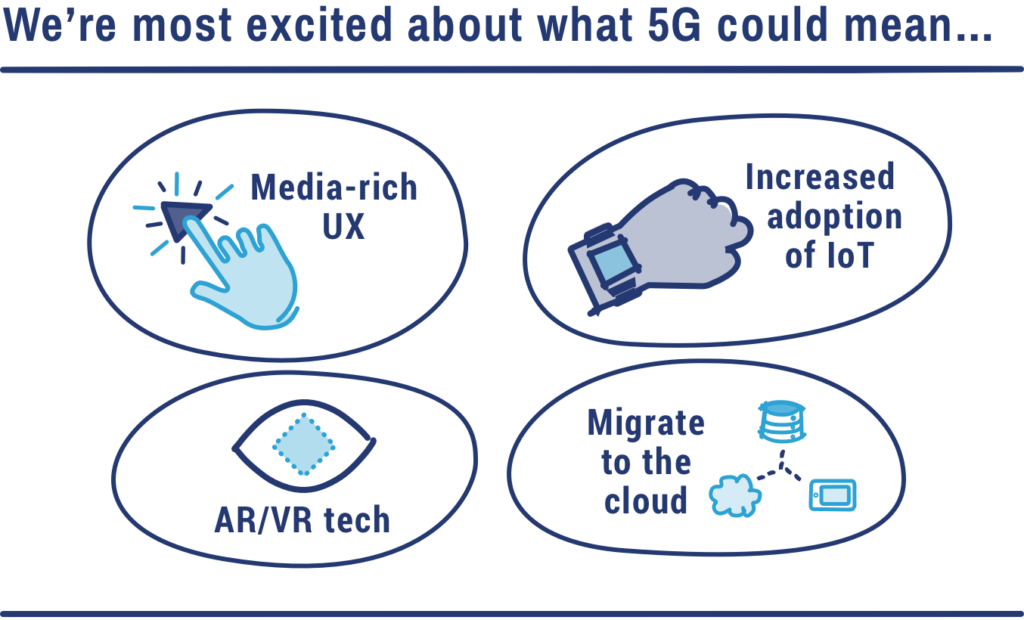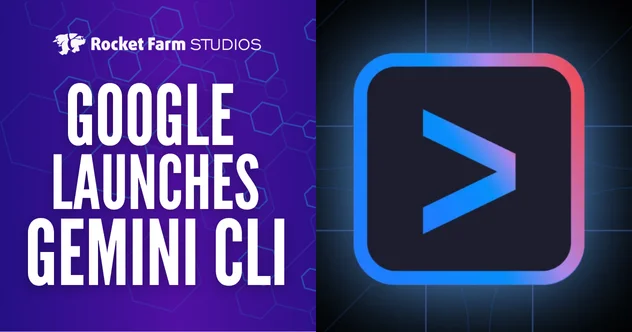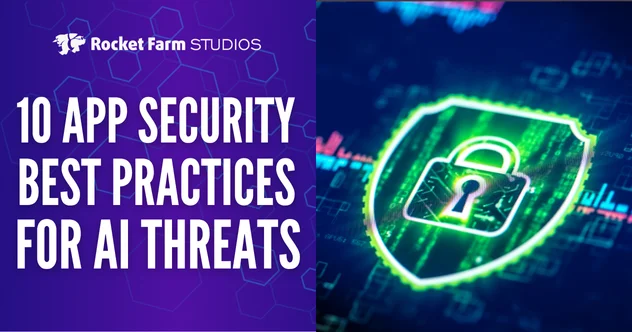Download our E-BOOK
What Does 5G Mean for App Development?
October 20, 2021
by The Rocket Farm Team
We’ve been hearing a lot about 5G for a few years now. The major players—AT&T, Verizon, and T-Mobile—all launched 5G for mobile back in 2019. A bit later in October 2020, Apple released the iPhone 12, 12 Mini, 12 Pro, and 12 Pro Max, the first iPhone products to support 5G connectivity. That sparked the boom.
In roughly the year since, we’ve seen Samsung, Google, OnePlus and others release their own 5G phones, and people are buying the technology. When the iPhone 12 was released, about 18% of all smartphones being shipped were 5G-capable. That number jumped to 32% within three months. And the IDC estimates the 5G smartphone market to grow from $161.4 billion in 2020 to $361.8 billion in 2021 and reach $454.7 billion by 2025.
With Verizon promising “The biggest upgrade ever” and T-Mobile promising “#5Gforall,” have we finally hit the point where 5g is the new norm?
Not exactly. As of right now, 5G isn’t available everywhere, all the benefits of it largely depend on your provider, device, and location, and it will take some time to wean everyone off 4G. I mean, there are folks out there still using 3G (at least until early 2022 when service providers plan to pull the plug).
However, coverage is growing by the minute, and that should get all businesses thinking about 5G app development because it is going to be a game changer.
We’re pumped thinking about the potential
5G is going to make mobile app development fun because it will remove many of the limitations we currently experience and open up opportunities to build some amazing products. Here’s why:
- 5G is so much faster. At its peak, 5G is 100 times faster than 4G and will potentially deliver up to three Gigabits of data per second. That will vastly improve transfer and download speeds.
- Latency is reduced big time. 5G can deliver data in a millisecond at its very best, compared to 50 milliseconds with 4G. We’re talking about true real-time data delivery.
- Connectivity. With much greater bandwidth, 5G could potentially connect a million devices for every square kilometer. That would allow seamless communication between hardware, sensor-based equipment, smart technology and wearables. It could also dramatically improve connectivity in densely populated areas.
- Stronger battery life. The high speed, low latency, optimum bandwidth of 5G means that tasks are finished faster. That reduces the battery power consumption, which could enable people to use apps for much longer.
The new capabilities open up a world of possibilities for organizations to develop new transformative technology—and it frees mobile app developers to do so much more.
Opportunities in mobile app development

We’re most excited about what 5G could mean for our clients. Startups to enterprises could:
- Offer media-rich user experiences. 5G will decrease application load times and make them more responsive, while offering higher visual quality. App developers will be able to add features and functionality they wouldn’t have been able to integrate in the past. For example, applications powered by 5G can offer faster, smoother video streaming, even of 4K and 8K video. Plus, longer battery life will promote seamless, uninterrupted viewing and usage.
- Increase adoption of IoT. With greater bandwidth and less power consumption, 5G supports app development for a range of connected devices and could boost the integration of AI and ML to build smarter, autonomous apps. For industries like healthcare, agriculture and manufacturing, increased adoption of IoT would literally transform their operations and service capabilities.
- Integrate AR/VR technology. Because 5G removes latency and bandwidth barriers, we can incorporate augmented reality (AR) and virtual reality (VR) into mobile applications to offer fully immersive experiences. Perhap that’s why we’re seeing explosive growth in virtual headset sales. While the tech bodes well for gaming and entertainment, it could transform the eCommerce and retail and training and development industries.
- Migrate to the cloud. The high transmission rates of 5G will enable the real-time transfer of data to the cloud, empowering more organizations to move their infrastructure to the cloud and run on cloud-based applications. That will reduce organizations’ dependency on hardware, such as servers setting in data centers and other infrastructure equipment.
Moving forward with 5G app development
In summary, because 5G is faster, adds bandwidth, and reduces latency, we going to continue to see a continued shift to cloud storage and computing, rapid development of IoT devices, and an increase in AI, ML, and AR/VR capabilities. We will be able to do so much more in the world of app development.
It’s a really cool time to be in the app development business, and we believe that 5G is going to enable us to build apps that better meet consumer demand and drive digital transformation. While the world won’t abandon 4G just yet, the demand for—and access to 5G—is growing. It’s a great time to think about what your existing app or app idea could be with 5G.
If you are ready to have that discussion, or simply want to talk about offering a better experience to all your users through app development, contact us today.
Related Blog & Posts

How to Increase conversion in 2025
With over 25 years in technology and product development, Dan leads Rocket Farm Studios with a commitment to innovation and growth.
Ready to turn your app idea into a market leader? Partner with Rocket Farm Studios and start your journey from MVP to lasting impact.”
Teams for App Development
We help companies build their
mobile app faster with go to market strategy

Technology and UX Audits

Early Design Sprints

MVP Creation

App Store

Growth Teams
Download Our Free E-Book
Whether you’re launching a new venture or scaling an established product, Rocket Farm Studios is here to turn your vision into reality. Let’s create something extraordinary together. Contact us to learn how we can help you achieve your goals.






